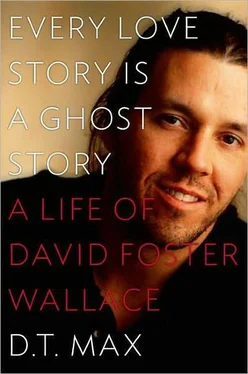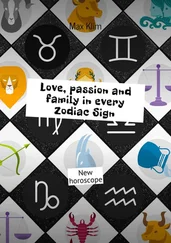Mirth is the Mail of Anguish
In which it cautious arm
Lest anybody spy the Blood
And “you’re hurt!” exclaim.
Wallace finished up the academic year amid disappointment. He told people he and Karr were growing closer but she had decided to move with her family to Syracuse, where she had been offered a teaching job. In a postcard to Franzen Wallace recorded his amazement at her departure. “I finally told Mary I’d marry her,” he complained, “and within 3 weeks she’d decided she couldn’t divorce her husband. She’s moving away with him in August. I am not pleased, but there is literally nothing I can do. I am sad.” (She says they were not in contact.) He spent a confused summer in Boston, pining for Karr. “Nothing is new,” he wrote to a college friend, “I go to…meetings, volunteer on their phone lines, read a lot, write a little.”
In late September Wallace moved out of the “sober house” on Foster Street and into a double-decker clapboard one on an anonymous stretch of Massachusetts Avenue in Arlington. He shared the apartment with another recovering substance abuser, probably a pairing Granada House had arranged. The man had a large collection of Tito Puente records, which Wallace called “crime jazz.” (He would work the witticism into Infinite Jest. ) “The apartment is strange,” he wrote Franzen in October. “Most everything is still in boxes. I have a mattress on the floor and wake up with dust on my tongue.” Franzen visited and found his friend in a messy bachelor pad, cold and dimly lit, a place to pass through. Wallace bumped into Gale Walden on the T — she had a research associate position at Harvard — and when she came by, she saw draft pages of a novel spread everywhere.
When a second year at Emerson began, Wallace undertook his work without pleasure. He had increased his load to three classes to make more money, teaching “back to back in the afternoon three days a week.” “All I do is work,” he complained to Franzen in October, threatening to sell his computer for cash. He still did not like the students and sedulously kept apart from his colleagues. Some of the other teachers in turn found Wallace standoffish, odd. One thought he seemed like he had Asperger’s syndrome and remembers him as theatrical in his isolation, taking up “some position from which the staff could view him, and from his small corner of the room stage he would pose as if in deep contemplation, or emotional pain or genius.” Wallace wrote Franzen, “I’ve had to educate myself about people like Stephen Crane and Edith Wharton. Actually that’s been a blast. I had no idea they were so good. I remember reading them a little in high school and mostly wondering when they were going to get done so I could go eat something sugary and then masturbate.” Liking “the canon” was one way of signaling to Franzen his aesthetic voyage. If he could read realist fiction, maybe he could write it. “The last thin patina of rebelliousness has fallen off,” he reported proudly to his friend in the same letter. “I am frightfully and thoroughly conventional.”
For nearly two years, Wallace had been living a hectic, unbalanced life. If he was no longer a substance abuser, he was still a drama junkie, a man afraid to be alone with his own thoughts. But Karr, around whom his every emotion orbited, was gone for good — or appeared to be so — and in early November 1991, Wallace suddenly collapsed again. It was his first breakdown since quitting drinking, and it devastated him. He was admitted to the Newton-Wellesley Hospital psychiatric unit with a diagnosis of suicidal depression. He lay in a locked ward for several days. Afterward, Debra Spark brought him student papers, because he wanted to keep up with his grading. “The people here are crazy,” he told her. She found the ward he was in scarier than McLean, where she had also visited him, and Wallace more frightened and depressed. The doctors at Newton-Wellesley increased the dose of Nardil he was on and he began to improve. After two weeks, he was released. He would write in a later medical history that depression and desperation came and went in the ensuing months, but over time the Nardil coursing through his blood relieved his condition and gave him back hope. Immediately, he was making plans. He had called Karr just before he was admitted to the hospital to tell her he loved her; now, as Karr remembers, he called her mother to say he was going to marry her daughter. “Didn’t you just get out of someplace?” she responded.
Wallace had not forgotten his literary hopes. Throughout 1990 and into 1991 he had fought off the worry that, sober, book reviewing and essays were all he was capable of. He wrote Nadell in the spring of 1991, as much to reassure himself as his agent, that things would change:
Please don’t give up on me. I want to be a writer now way more than in 1985. I think I can be better than I was but it’s going to take time — and believe me, I know that quite a bit of time has elapsed already…. Do not assume, please, that I am being slothful or distracted because I have not sent you any fiction to publish. Do not assume I’ve given up in despair, or that I’ve burned out. I haven’t, I swear. It may be a couple more years before I finish anything both long and respectable, but I will. Please don’t forget me, and please don’t let Gerry forget me either…. I write daily, on a schedule, am at least publishing hackwork and I will be a fiction writer again or die trying.
The Review of Contemporary Fiction had decided to devote an issue to Wallace and Vollmann and another young writer, Susan Daitch. In a long interview for the magazine that Wallace gave to Larry McCaffery that April, he hinted how much trouble he was having writing. “It seems like the big distinction between good art and so-so art lies…in be[ing] willing to sort of die in order to move the reader, somehow. Even now I’m scared about how sappy this’ll look in print, saying this. And the effort to actually do it, not just talk about it, requires a kind of courage I don’t seem to have yet.” But by August 1991, four months later, the courage was mysteriously back. In that month he wrote Forrest Ashby that he was “slowly trying some fictional stuff, which so far is not very good, and almost completely unrecognizable vis a vis the stuff I was doing before I well, whatever,” and to his old professor Dale Peterson he spoke of “writing quite a bit and enjoying it for the first time in years.” What had helped him break through? Part of the credit should go to the Harper’s essay Wallace had been writing. The subject of the essay had expanded from how television changes our perception of reality to the crisis in the generation of which Wallace was a part, the two being, of course, to him, closely related. Since Arizona, Wallace had been calling for a fiction that captured how thoroughly television had altered the minds of its watchers. But since McLean and recovery, he had begun to realize that portraying such a world in fiction might be just as harmful as TV itself. There was no reason to think that limning a hopeless condition would show a way out; it might just make imprisonment more pleasant. Now Wallace reformulated his goal: American fiction was not in just an aesthetic crisis, but a moral one. Exhibit A was a writer he had once lavished a great deal of affection on, Mark Leyner, whose novel My Cousin, My Gastroenterologist he had touted when he lived in Somerville. The novel, really seventeen linked stories, is clever and almost schizophrenically scattered, embodying less a plot than an attitude toward modernity. One story — it might almost have been a set piece in Broom —features a character named Big Squirrel, who is, in Wallace’s words, “a TV kiddie-show host and kung fu mercenary.” In another story a father lives in his basement centrifuging mouse hybridoma. One section is entitled “lines composed after inhaling paint thinner.” When Wallace first read the book, he had reveled in its aggressive, postrealist stance, its avant-pop insistence that the overwhelming incoherence of modern culture was a joyride for the brain. But the new Wallace, in his television essay, would call the book “a methedrine compound of pop pastiche, offhand high tech, and dazzling televisual parody,” and quote the jacket copy’s claim that the book was “a fiction analogue of the best drug you ever took,” a description that anyone aware of Wallace’s situation would have recognized as far from an endorsement on his part. America was, Wallace now knew, a nation of addicts, unable to see that what looked like love freely given was really need neurotically and chronically unsatisfied. The effect of Leyner’s fictional approach to life — mutated, roving, uncommitted — like that of Letterman and Saturday Night Live —was to make our addiction seem clever, deliberate, entered into voluntarily. Wallace knew better.
Читать дальше












